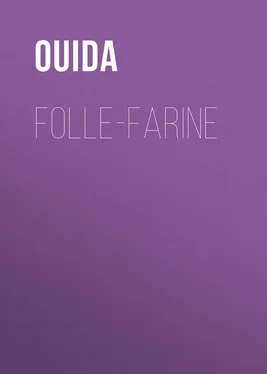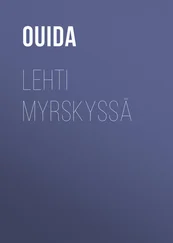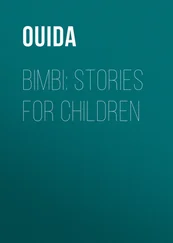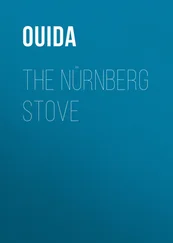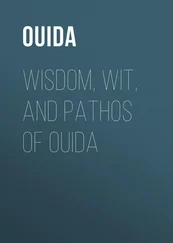Ouida - Folle-Farine
Здесь есть возможность читать онлайн «Ouida - Folle-Farine» — ознакомительный отрывок электронной книги совершенно бесплатно, а после прочтения отрывка купить полную версию. В некоторых случаях можно слушать аудио, скачать через торрент в формате fb2 и присутствует краткое содержание. Жанр: foreign_prose, literature_19, foreign_antique, на английском языке. Описание произведения, (предисловие) а так же отзывы посетителей доступны на портале библиотеки ЛибКат.
- Название:Folle-Farine
- Автор:
- Жанр:
- Год:неизвестен
- ISBN:нет данных
- Рейтинг книги:5 / 5. Голосов: 1
-
Избранное:Добавить в избранное
- Отзывы:
-
Ваша оценка:
- 100
- 1
- 2
- 3
- 4
- 5
Folle-Farine: краткое содержание, описание и аннотация
Предлагаем к чтению аннотацию, описание, краткое содержание или предисловие (зависит от того, что написал сам автор книги «Folle-Farine»). Если вы не нашли необходимую информацию о книге — напишите в комментариях, мы постараемся отыскать её.
Folle-Farine — читать онлайн ознакомительный отрывок
Ниже представлен текст книги, разбитый по страницам. Система сохранения места последней прочитанной страницы, позволяет с удобством читать онлайн бесплатно книгу «Folle-Farine», без необходимости каждый раз заново искать на чём Вы остановились. Поставьте закладку, и сможете в любой момент перейти на страницу, на которой закончили чтение.
Интервал:
Закладка:
Through the golden motes of the dancing air and of the quivering sunbeams, whilst high above the lark sang on, there came along the road a girl.
She was bare-footed, and bare-throated, lithe of movement, and straight and supple as one who passed her life on the open lands and was abroad in all changes of the weather. She walked with the free and fearless measure of the countrywomen of Rome or the desert-born women of Nubia; she had barely completed her sixteenth year, but her bosom and limbs were full and firm, and moulded with almost all the luxuriant splendor of maturity; her head was not covered after the fashion of the country, but had a scarlet kerchief wound about. On it she bore a flat basket, filled high with fruits and herbs and flowers; a mass of color and of blossom, through which her dark level brows and her great eyes, blue-black as a tempestuous night, looked out, set straight against the sun.
She came on, treading down the dust with her long and slender feet, that were such feet as a sculptor would give to his Cleopatra or his Phryne. Her face was grave, shadowed, even fierce; and her mouth, though scarlet as a berry and full and curled, had its lips pressed close on one another, like the lips of one who has long kept silence, and may keep it—until death.
As she saw the old man her eyes changed and lightened with a smile which for the moment banished all the gloom and savage patience from her eyes, and made them mellow and lustrous as a southern sun.
She paused before him, and spoke, showing her beautiful white teeth, small and even, like rows of cowry shells.
"You are well, Marcellin?"
The old man started, and looked up with a certain gladness on his own keen visage, which had lost all expression save such as an intense and absorbed retrospection will lend.
"Fool!" he made answer, harshly yet not unkindly. "When will you know that so long as an old man lives so long it cannot be 'well' with him?"
"Need one be a man, or old, to answer so?"
She spoke in the accent and the language of the province, but with a voice rich and pure and cold; not the voice of the north, or of any peasantry.
She put her basket down from off her head, and leaned against the trunk of the poplar beside him, crossing her arms upon her bare chest.
"To the young everything is possible; to the old nothing," he said curtly.
Her eyes gleamed with a thirsty longing; she made him no reply.
He broke off half his dry bread and tendered it to her. She shook her head and motioned it away; yet she was as sharp-hungered as any hawk that has hunted all through the night and the woods, and has killed nothing. The growing life, the superb strength, the lofty stature of her made her need constant nourishment, as young trees need it; and she was fed as scantily as a blind beggar's dog, and less willingly than a galley-slave.
The kindly air had fed her richly, strongly, continually; that was all.
"Possible!" she said slowly, after awhile. "What is 'possible'? I do not understand."
The old man, Marcellin, smiled grimly.
"You see that lark? It soars there, and sings there. It is possible that a fowler may hide in the grasses; it is possible that it may be shot as it sings; it is possible that it may have the honor to die in agony, to grace a rich man's table. You see?"
She mused a moment; her brain was rapid in intuitive perception, but barren of all culture; it took her many moments to follow the filmy track of a metaphorical utterance.
But by degrees she saw his meaning, and the shadow settled over her face again.
"The 'possible,' then, is only—the worse?" she said slowly.
The old man smiled still grimly.
"Nay; our friends the priests say there is a 'possible' which will give—one day—the fowler who kills the lark the wings of the lark, and the lark's power to sing Laus Deo in heaven. I do not say—they do."
"The priests!" All the scorn of which her curved lips were capable curled on them, and a deep hate gathered in her eyes—a hate that was unfathomable and mute.
"Then there is no 'possible' for me," she said bitterly, "if so be that priests hold the gifts of it?"
Marcellin looked up at her from under his bushy white eyebrows; a glance fleet and keen as the gleam of blue steel.
"Yes, there is," he said curtly. "You are a woman-child, and have beauty: the devil will give you one."
"Always the devil!" she muttered. There was impatience in her echo of the words, and yet there was an awe also as of one who uses a name that is mighty and full of majesty, although familiar.
"Always the devil!" repeated Marcellin. "For the world is always of men."
His meaning this time lay too deep for her, and passed her; she stood leaning against the poplar, with her head bent and her form motionless and golden in the sunlight like a statue of bronze.
"If men be devils they are my brethren," she said suddenly; "why do they, then, so hate me?"
The old man stroked his beard.
"Because Fraternity is Hate. Cain said so; but God would not believe him."
She mused over the saying; silent still.
The lark dropped down from heaven, suddenly falling through the air, mute. It had been struck by a sparrow-hawk, which flashed back against the azure of the skies and the white haze of the atmosphere; and which flew down in the track of the lark, and seized it ere it gained the shelter of the grass, and bore it away within his talons.
Marcellin pointed to it with his pipe-stem.
"You see, there are many forms of the 'possible'–"
"When it means Death," she added.
The old man took his pipe back and smoked.
"Of course. Death is the key-note of creation."
Again she did not comprehend; a puzzled pain clouded the luster of her eyes.
"But the lark praised God—why should it be so dealt with?"
Marcellin smiled grimly.
"Abel was praising God; but that did not turn aside the steel."
She was silent yet again; he had told her that old story of the sons born of Eve, and the one whom, hearing it, she had understood and pitied had been Cain.
At that moment, through the roadway that wound across the meadows and through the corn lands and the trees, there came in sight a gleam of scarlet that was not from the poppies, a flash of silver that was not from the river, a column of smoke that was not from the weeds that burned on the hillside.
There came a moving cloud, with a melodious murmur softly rising from it; a cloud that moved between the high flowering hedges, the tall amber wheat, the slender poplars, and the fruitful orchards; a cloud that grew larger and clearer as it drew more near to them, and left the green water-meadows and the winding field-paths for the great highroad.
It was a procession of the Church.
It drew closer and closer by slow imperceptible degrees, until it approached them; the old man sat upright, not taking his cap from his head nor his pipe from his mouth; the young girl ceased to lean for rest against the tree, and stood with her arms crossed on her breast.
The Church passed them; the gilt crucifix held aloft, the scarlet and the white of the floating robes catching the sunlight; the silver chains and the silver censers gleaming, the fresh young voices of the singing children cleaving the air like a rush of wind; the dark shorn faces of the priests bowed over open books, the tender sound of little bells ringing across the low deep monotony of prayer.
The Church passed them; the dust of the parched road rose up in a choking mass; the heavy mist of the incense hung darkly on the sunlit air; the tramp of the many feet startled the birds from their rest, and pierced through the noonday silence.
It passed them, and left them behind it; but the fresh leaves were choked and whitened; the birds were fluttered and affrightened; the old man coughed, the girl strove to brush the dust motes from her smarting eyelids.
Читать дальшеИнтервал:
Закладка:
Похожие книги на «Folle-Farine»
Представляем Вашему вниманию похожие книги на «Folle-Farine» списком для выбора. Мы отобрали схожую по названию и смыслу литературу в надежде предоставить читателям больше вариантов отыскать новые, интересные, ещё непрочитанные произведения.
Обсуждение, отзывы о книге «Folle-Farine» и просто собственные мнения читателей. Оставьте ваши комментарии, напишите, что Вы думаете о произведении, его смысле или главных героях. Укажите что конкретно понравилось, а что нет, и почему Вы так считаете.
